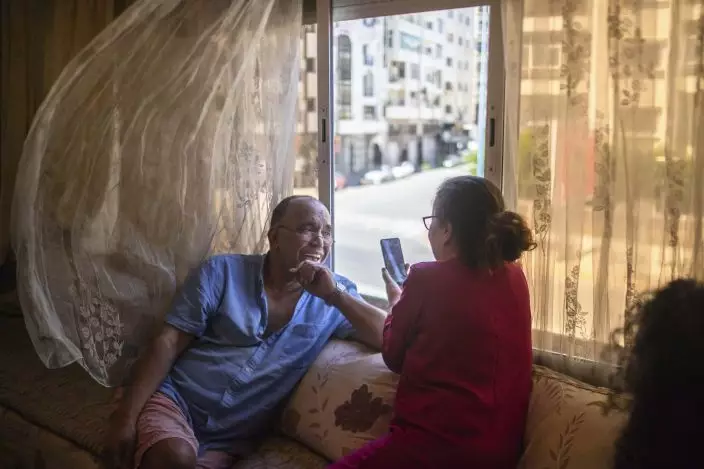As Brazil and India struggle with surging coronavirus cases, a top health expert is warning that the world is still smack in the middle of the pandemic, dampening hopes for a speedy global economic rebound and renewed international travel.
“Right now, we’re not in the second wave. We’re right in the middle of the first wave globally,” said Dr. Mike Ryan, the World Health Organization’s executive director.
“We’re still very much in a phase where the disease is actually on the way up,” Ryan said, pointing to South America, South Asia and other parts of the world.

Afifa, right, and her husband, Moustafa, video call with their relatives on the first day of Eid in lockdown due to the Coronavirus pandemic, in Casablanca, Morocco, Sunday, May 24, 2020. Instead of mass prayers and large family gatherings filled with colorful clothes, gifts, and traditional foods, millions of Moroccan Muslims celebrated Eid Al-Fitr at home, subdued and isolated amid their country's newly extended coronavirus lockdown. (AP PhotoMosa'ab Elshamy)
Here are some of AP’s top stories Tuesday on the world’s coronavirus pandemic. Follow APNews.com/VirusOutbreak for updates through the day and APNews.com/UnderstandingtheOutbreak for stories explaining some of its complexities.
WHAT’S HAPPENING TODAY:
— A U.S. biotechnology company began injecting a coronavirus vaccine candidate into people in Australia with hopes of releasing a proven vaccine this year. Novavax will inject 131 volunteers in the first phase of the trial testing the safety of the vaccine and looking for signs of its effectiveness, the company’s research chief Dr. Gregory Glenn said.
— Manaus is one of the hardest hit cities in Brazil, but in the absence of evidence proving otherwise, relatives are quick to deny the possibility that COVID-19 claimed their loved ones, meaning that the national death toll of more than 23,000 toll is likely a vast undercount.
— The U.S. meat and poultry industry has historically relied on immigrant labor to do some of the most dangerous jobs in America. Now that reliance and uncertainty about the pandemic is fueling concerns about possible labor shortages to meet demands for beef, pork and chicken.
— California's churches, mosques and synagogues may get the nod to reopen their doors sooner than expected under new state guidelines that suggest masks should be worn, temperatures taken and services shortened. In-person religious services are relegated to phase three of California's four-stage plan to restart the battered economy, which Gov. Gavin Newsom had said could be weeks away. But they could come much sooner under the guidelines.
— Latam Airlines, South America’s biggest carrier, sought U.S. bankruptcy protection as it grapples with a sharp downturn in air travel sparked by the coronavirus pandemic. The Chapter 11 bankruptcy filing underscores the severity of the financial challenges facing the travel industry as a result of the lockdowns, quarantines and other measures taken by governments to stem the spread of the virus that causes COVID-19.
WHAT YOU NEED TO KNOW:
For most people, the coronavirus causes mild or moderate symptoms, such as fever and cough that clear up in two to three weeks. For some, especially older adults and people with existing health problems, it can cause more severe illness, including pneumonia and death. The vast majority of people recover.
Here are the symptoms of the virus compared with the common flu.
One of the best ways to prevent spread of the virus is washing your hands with soap and water. The U.S. Centers for Disease Control and Prevention recommends first washing with warm or cold water and then lathering soap for 20 seconds to get it on the backs of hands, between fingers and under fingernails before rinsing off.
You should wash your phone, too. Here’s how.
TRACKING THE VIRUS: Drill down and zoom in at the individual county level, and you can access numbers that will show you the situation where you are, and where loved ones or people you’re worried about live.
ONE NUMBER:
— 250,000: That's the estimated number of registered migrant laborers in Lebanon who aren't covered by labor laws and are now trapped. Many aren’t getting paid because of the crisis and they can’t go home with airports closed. “We are invisible,” says one Ethiopian domestic worker. They are growing ever more desperate.
IN OTHER NEWS:
— EID IN CONFINEMENT: Instead of mass prayers and family gatherings, millions of Moroccan Muslims celebrated Eid Al-Fitr indoors.
— FOOD BANKS: The U.S. Agriculture Department is spending $3 billion to help get farm products to food banks, and a senator is seeking $8 billion more to buy farm produce for food banks.
Follow AP coverage of the virus outbreak at https://apnews.com/VirusOutbreak and https://apnews.com/UnderstandingtheOutbreak


